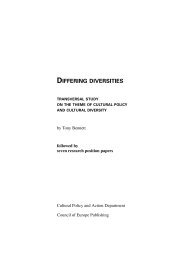Why we need European cultural policies: the impact of EU ...
Why we need European cultural policies: the impact of EU ...
Why we need European cultural policies: the impact of EU ...
Create successful ePaper yourself
Turn your PDF publications into a flip-book with our unique Google optimized e-Paper software.
Maastricht TreatyIt was in this treaty, which was adopted in 1992 and came into force in 1993, that culture wasfirst explicitly addressed – in Article 128.MEDIAThis is a <strong>European</strong> Union programme which aims to streng<strong>the</strong>n <strong>the</strong> competitiveness <strong>of</strong> <strong>the</strong> <strong>European</strong>audiovisual industry. It is now in its third phase. It supports pr<strong>of</strong>essional training, development <strong>of</strong>production companies and helps with distribution and promotion <strong>of</strong> audiovisual products.PHAREThe PHARE programme was <strong>the</strong> <strong>EU</strong>’s first effort to help <strong>the</strong> post-socialist countries make<strong>the</strong> transition to multi-party democracies. It has helped ensure that <strong>the</strong>se countries have <strong>the</strong>administrative capacities to meet <strong>the</strong> rights and obligations <strong>of</strong> <strong>EU</strong> membership. It also providessupport for infrastructure projects, ranging from huge transport improvements to supplyingmedical equipment.PiracyPiracy involves <strong>the</strong> infringement <strong>of</strong> copyrights by unauthorized reproduction or use <strong>of</strong>something – it could be computer s<strong>of</strong>tware, CDs, music on <strong>the</strong> internet, and so on. It usuallyinvolves large-scale or commercial distribution or sale <strong>of</strong> illegal copies <strong>of</strong> works. (See copyright.)Post-socialist countriesThis term is sometimes used to describe post-socialist countries <strong>of</strong> Central and Eastern Europe.Some <strong>of</strong> <strong>the</strong>m became members <strong>of</strong> <strong>the</strong> <strong>EU</strong> in 2004, while some are ei<strong>the</strong>r candidate countries orapplying to become members.Structural fundsThe <strong>EU</strong> has had four structural funds, which it has been using to help improve economic andsocial problems. Culture has benefited from use <strong>of</strong> structural funds. At <strong>the</strong> time <strong>of</strong> writing <strong>the</strong>sefunds are being reorganized – some are merging.SubsidiaritySubsidiarity is <strong>the</strong> principle that decisions should always be taken at <strong>the</strong> lo<strong>we</strong>st possible level orclosest to where <strong>the</strong>y will have <strong>the</strong>ir effect, for example in a local area ra<strong>the</strong>r than nationally. Seealso footnote 5.Television without frontiersThe Television without frontiers directive created a legal framework which made it possiblefor <strong>European</strong>-made television programmes to be freely shown throughout <strong>the</strong> <strong>EU</strong>. It was passedin 1989 and updated in 1997. It may be updated again to take account <strong>of</strong> developments indigital broadcasting.114Annex 4 Glossary














